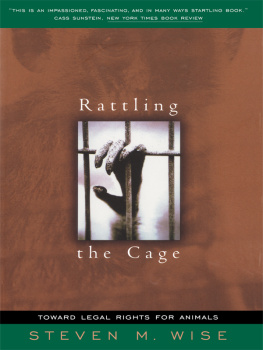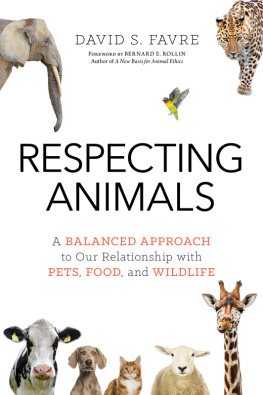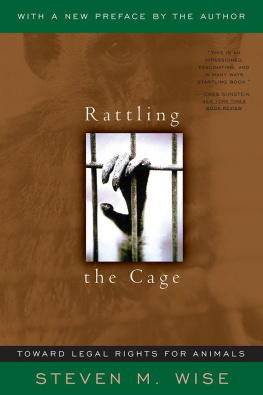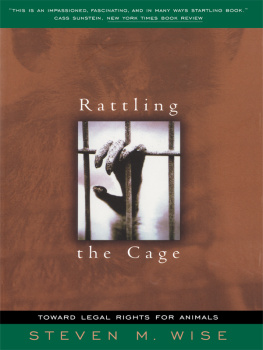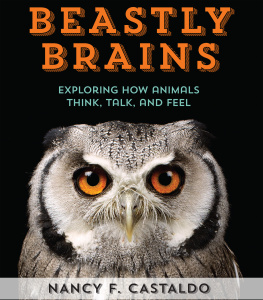Many of the designations used by manufacturers and sellers to distinguish their products are claimed as trademarks. Where those designations appear in this book and Basic Books was aware of a trademark claim, the designations have been printed in initial capital letters.
A CIP catalog record for this book is available from the Library of Congress.
ISBN-13: 978-0-7382-0437-6; ISBN-10: 0-7382-0437-4
Copyright 2000 by Steven M. Wise
All rights reserved. No part of this publication may be reproduced, stored in a retrieval system, or transmitted, in any form or by any means, electronic, mechanical, photocopying, recording, or otherwise, without the prior written permission of the publisher. Printed in the United States of America.
Books published by Basic Books are available at special discounts for bulk purchases in the U.S. by corporations, institutions, and other organizations. For more information, please contact the Special Markets Department at the Perseus Books Group, 800/255-1514 or special.markets@perseusbooks.com.
FOREWORD
by Jane Goodall
Rattling the Cage is an important book, an exciting book. It will be welcomed by everyone who is concerned about the well-being of animals, by those who are, as I am, kept awake by grim mental images of the abuse inflicted on other animals by humans. I was honoured when Steve Wise asked me to write this introduction, for I believe that Rattling the Cage, thanks to all the long years of research that went into the writing, will make an impact, and leave its mark on the process of law. I see it as a major stepping-stone along a road that is gradually leading to a new legal relationship between humans and other sentient, sapient life forms.
Steve Wise is a law school professor. He is also an accomplished animal-rights legal scholar and one of the worlds most prominent animal-rights lawyers. Steve and his wife, Debi, defend a variety of animal species across the United States and advise those who defend animals around the world. In writing Rattling the Cage, Steve has used his experience in both science and law to great advantage, and he has a trial lawyers knack for telling a good story. He explains, for example, why it matters so much today whether an ox who gored a passerby on a road in the Middle East four thousand years ago was Babylonian or Hebrew. And why, four hundred years ago, an early animal advocate stood up for barleyeating rats in a French courtroom. And, most surprisingly, why John Quincy Adams would thunder on the floor of the U.S. House of Representatives that he would present petitions to the Congress from horses or dogs if they asked him to.
In many ways this book can be seen as the animals Magna Carta, Declaration of Independence, and Universal Declaration of Rights all in one. And it is timely. Twentyeven tenyears ago, Steve would have been out on a limb, ridiculed by his colleagues and largely ignored by the lay public. But attitudes toward animals have changed. Very few scientists today believe that nonhuman animals are simply mindless machines, collections of stimuli and responses. Of course, it would be convenient to believe that this was true, that there was a basic and fundamental difference between ourselves and the rest of the animal kingdom. Then we could do unpleasant things to them without any feelings of guilt. But this is scarcely an option today, when there have been so many descriptions of incredibly complex social behavior and so many examples of intelligent behavior from so many careful field studies on a whole variety of animal species. Our thirty-nine years with wild chimpanzees at Gombe, for example, has taught us much about these relatives of ours, each with his or her own unique personality. They share so many of our behaviors. They form close affectionate bonds with each other that may persist through a life of sixty or more years; they feel joy and sorrow and despair, mental as well as physical suffering; they show many of the intellectual skills that until recently we believed unique to ourselves; they look into mirrors and see themselves as individuals they have consciousness of self. Admittedly, chimpanzees are capable, as are we, of acts of brutality. But they also demonstrate empathy, compassion, altruism, and love. Should not beings of this sort have the same kind of legal rights as those we grant to human infants or the mentally disabled, who also cannot speak for themselves?
This book outlines how legal changes for animals, once thought impossible (and there were very few who even bothered to consider this at all), can actually happen. Then we shall have another way of fighting the injustice that is still perpetuated on animals of all kindsby science, agribusiness, the pharmaceutical industry, the live-animal traders, and so on. If only such a change in law could have happened in time to save Jojo, Jade, and Dick.
Jojo was the first adult male chimpanzee whom I met in a medical research laboratorywhich was, of course, in the basement, with no windows. JoJo was, like the other nine adult males who shared space with him, confined in a five-foot by five-foot cage. There were thick steel bars between JoJo and me. And there were bars on either side of him, and above and below. His view of the world was utterly distorted by thick steel bars. He had one motor tyre in his cell, and a drinking spout. He had been born in the African forest; he had spent more than ten years in the lab. Then there was Jade. For more than seven years she had earned her living by attending up-market birthday parties, and other such social events. When I met her, she was about eight years old and her teeth had been pulled. She was dressed in human clothes. She had been brought, as an ambassador for her species, to a fund-raising dinner. When we met, I greeted her in chimp style, and after that, from the opposite end of the vary large table, she gave her toothless grin every time I caught her eye. I knew she wanted to come over; I knew she had been disciplined to remain in her place, slurping soft foods. I desperately avoided looking at her, filled with anger that she was thus exploited. At the end of the meal, she was allowed to come and clamp her arms around me and breathe her sadness into my neck. And there was Dick. When I met him he lived in a small zoo cage with a cement floor. He had a female with him, but clearly had little time for her. He sat in the corner endlessly tapping each finger of his left hand in turn with the index finger of his right hand, in time to the rhythmic opening and shutting of his mouth. In the cage next to him, a lone male gorilla endlessly vomited into his hand and reingested the vomit. Dick was the first captive chimpanzee to whom I made a commitmentI would work to try to better his condition, and that of countless other captive apes around the world.
Since I met Dick in 1956, ethical concerns about our treatment of animals are surfacing everywhere; there are, for example, groups of physicians, surgeons, psychologists, veterinariansand lawyerswho protest abuse of animals and lobby for change. There are more than seven thousand different animal rights/welfare groups in the United States alone, and there are increasing numbers of people speaking out against intensive or factory farming of food animals, against trapping, hunting, exotic animals in circuses, movies and advertising, puppy millsand on and on. And there is growing concern for animal welfare in all parts of the world, including the developing world.

